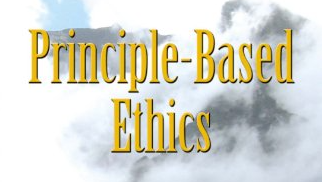
Schuklenk1 defined ethics, as a means of providing guidance to researchers regarding how they ought to behave and act in a situation in addition to outlining justified reasons for doing so. Paradoxically, there is no universal ethical consensus, only several competing ethical theories. In the following sections, this author would like to compare principle-based ethics, deontological ethics, and utilitarian ethics. Furthermore, strengths and limitations will be considered for each theory to elucidate a better understanding and appreciation of implementing ethics.

Principle-based ethics was developed by Beaucamp and Childress and the underlying premise of the researchers’ ethical reasoning, was the concept of four prima facie principles: autonomy, beneficence, non-maleficence, and justice.1(4) Said principles were thought to be universal and valued by all people, despite religious or ethical convictions.1(4) However, there is an inherent weakness within such an ethical paradigm; prima facie means that said principles can be subjugated by more central concerns.1(5) Thus, these principles are not absolute, and fail to uphold the vital objectives of ethics; to guide both action and reasoning in different situations.

Deontological ethics is predicated on the reasoning that duty and moral obligation drives a researcher’s choices and actions.1(5) This encourages researchers to become cognizant of a research participant’s welfare. Such an ethical paradigm also encourages the researcher to place the wellbeing of the participant before the needs of the research goals itself. However, the deontological approach lacks a hierarchy and system of categorizing moral duties.1(5) However, the researcher can become conflicted due to the problem of prioritizing duties if/when they conflict with each other. Thus, the deontological approach shares a similar limitation to the principal-based theory; individual weaknesses can influence the ethical guidance of actions and reasoning.

The driver behind utilitarian ethics should minimize harm to the trial participant, and maximize utility to the widest population possible.1(6) The transparency and precision of such a mandate allows for the development of systematic protocols. However, difficulty anticipating all costs (i.e., trial participant burdens and risks) could become problematic before the research initiates.1(6) Such a hesitation to proceed could potentially withhold valuable findings that could benefit an individual and society. Another challenge is that although utilitarians believe minimal harm should be inflicted upon a trial participant, researchers do not place intrinsic value upon informed consent.1(6) That is, even if the participant was aware of risks and consented anyways, a utilitarian approach might still deny meaningful research.
Ethics is complex, yet necessary, practice in research. As seen in the aforementioned sections, there are many interpretations and perspectives of ethical approaches. However, such challenges do not negate or trivialize the importance, development, and application of ethics; said theories remain relevant as they facilitate continued refinement of researchers’ choices and rationale behind them.
References
1. Schuklenk U. Module one: Introduction to research ethics. Dev World Bioeth(1):1-13. doi:10.1111/j.1471-8847.2005.00099.x
-Michael McIsaac
